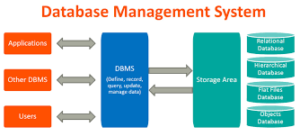Database Management System (DBMS)

Database Management System for Training is provided by TechFly, Jodhpur. Here we are discussing DBMS Introduction, Features, Advantages & Course. Database Management System is a very important component.
Database Management System (DBMS) is a database as information stored on a computer that is used to record, maintain, and retrieve data. It is an organized collection of a database. Common database structures are hierarchical, network, relational, and object-oriented-based, and the most widely used relational database for web applications.
The database management system can be divided into five major components; they are:
- Hardware
- Software
- Data
- Procedures
- Database Access Language
DBMS Components: Hardware
When we say hardware, we mean computers, hard disks, I/O channels for data, and any other physical component involved before any data is successfully stored in the memory.
When we run Oracle or MySQL on our personal computer, then our computer’s hard disk, our keyboard using which we type in all the commands, and our computer’s RAM, and ROM all become a part of the DBMS hardware.
Database Management System Components: Software
This is the main component, as this is the program that controls everything. The DBMS software is more like a wrapper around the physical database, which provides us with an easy-to-use interface to store, access, and update data.
The DBMS software is capable of understanding the database access language and interpreting it into actual database commands to execute them on the DB.

DBMS Components: Data
Data is the resource for which DBMS was designed. The motive behind the creation of DBMS was to store and utilize data.
In a typical database, the user-saved data is present, and metadata is stored.
Metadata is data about the data. This is information stored by the DBMS to better understand the data stored in it.
For example, when I store my name in a database, the DBMS will store when the name was stored in the database, what the size of the name is, whether it is stored as related data to some other data, or whether it is independent. All this information is metadata.
DBMS Components: Procedures
Procedures refer to general instructions to use a database management system. This includes procedures to set up and install a DBMS, to log in and log out of DBMS software, to manage databases, to take backups, to generate reports, etc.
DBMS Components: Database Access Language
Database Access Language is a simple language designed to write commands to access, insert, update, and delete data stored in any database.
A user can write commands in the database access language and submit them to the DBMS for execution, which is then translated and executed by the DBMS.
A user can create new databases and tables, insert data, fetch stored data, update data, and delete the data using the access language.
Features of Database Management Systems (DBMS):
1. DBMS to insert, modify/insert/delete data for them, and thus it acts as a layer of abstraction from the top of the file system.
2. DBMS works as a centralized database & distributed database.
3. DBMS interacts with a query language that is called structured query language (SQL).
4. Database systems optimize and store data in fields, records, files, or objects.
5. DBMS validates data entered against allowed types & sizes before storing it.
Advantages of Database Management Systems (DBMS): –
1. DBMS protecting confidential & sensitive data.
2. Data backup facility to ensure safe & secure availability of data.
3. Access logs & tables make it easier to store data in a database, each field having its own size, type, and a set of ranges.
4. Formulas such as counting, averaging, and summing are included in the DBMS, which makes data analysis and presentation easy.
5. DBMS has performance monitoring and optimization tools for a database.
Master Database Management System (DBMS) with TechFly
Unlock the potential of efficient data organization and management by joining the Database Management System (DBMS) course at TechFly IT Solutions and Training Center. Whether you’re a beginner or looking to advance your knowledge, we offer a comprehensive program to help you excel in database technologies.
Course Highlights:
- Core DBMS Concepts:
Understand fundamental concepts such as data models, schema design, normalization, and ER diagrams. - SQL Mastery:
Learn to write, optimize, and manage SQL queries to handle complex database operations. - Advanced Topics:
Dive deep into transaction management, concurrency control, indexing, and database security. - Hands-On Practice:
Work on real-world projects and case studies to gain practical experience.
Why Choose TechFly?
TechFly is renowned as the Best Coaching Center for DBMS in Jodhpur. Our industry-expert trainers ensure personalized guidance and a curriculum tailored to meet the latest industry requirements.
Benefits of Learning DBMS:
- Gain in-demand skills for data management.
- Build a strong foundation for careers in data analytics, database administration, and software development.
- Enhance your problem-solving and logical thinking abilities.
Enroll Today!
Don’t miss the chance to learn from the best training center for DBMS in Jodhpur. Visit TechFly IT Solutions to start your journey toward a successful career in database management.

